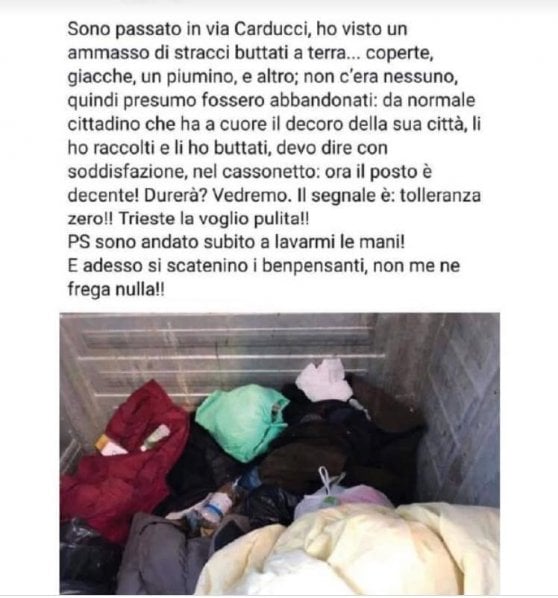Public Cleansing, memorials and humanity

Last Friday (the 4th of January) the vice-mayor of the Italian city of Trieste put up a post on Facebook in which he explained that while walking through one of the streets of the city he had come across a pile of covers, jackets and other similar stuff.
“Since there was nobody around”, he posted, “I presumed that they were abandoned and as a normal citizen who has at heart the decorum of the city, I collected them and threw them away, may I add with satisfaction: now the place is decent! Will it last? We will see. The message is: zero tolerance. I want a clean Trieste!! PS I immediately washed my hands. And now may the do-gooders unleash their criticism, I don’t give a damn.”
Paolo Polidori hails from the party of Matteo Salvini, the same party that wants a zero tolerance policy on migration. He knew full well that the covers, jackets and other paraphernalia that help to shelter from the cold were not abandoned but belonged to a clochard – a homeless person. His act though was met with widespread indignation.
A group of citizens met at a caffe’ in Trieste and opted to act. They collected new covers and jackets and placed them in the same place on Via Carducci where the Vice-Mayor had performed his act of public cleansing. They added a cardboard sign with a written apology to the homeless person – an apology in the name of all the people of Trieste.
The clochard has yet to turn up on the site and claim his new materials for warmth and comfort. What happened though is that the space where the apology note was left has become a symbol: it has taken on a political meaning. It has become a focal point of public expressions of solidarity. On Sunday numerous citizens of Trieste visited the site and left something: a scarf, a sweater, a pullover a beret…. a cushion.
It is ironic that the story of the clochard’s sleeping space in Trieste is the story of memorials in reverse. In other parts of the world, Ministers and government apparatchiks hang on to the execrable excuse of cleanliness and public order in order to attempt to obliterate a public expression of justice and solidarity. Trieste’s space transformed into a strong symbol after the first cleansing by a misguided politician.
Other spaces around the world are still ‘cleansed’ daily by representatives and supporters of a political class that twists the understanding of basic tenets of the legal order and transforms the rule of law into rule by law. Public memory and expression is of fundamental importance in a democracy – just look at what is happening in Hungary and Czech Republic were the governments in the two countries are doing their utmost to forget to commemorate Imre Nagy and Jan Palach.







